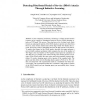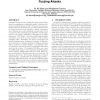12 search results - page 2 / 3 » Machine Learning for Automatic Defence Against Distributed D... |
IDEAL
2003
Springer
13 years 10 months ago
2003
Springer
As the complexity of Internet is scaled up, it is likely for the Internet resources to be exposed to Distributed Denial of Service (DDoS) flooding attacks on TCP-based Web servers....
DIMVA
2009
13 years 6 months ago
2009
Drive-by download attacks are among the most common methods for spreading malware today. These attacks typically exploit memory corruption vulnerabilities in web browsers and brows...
ICC
2009
IEEE
13 years 11 months ago
2009
IEEE
—Flash-crowd attacks are the most vicious form of distributed denial of service (DDoS). They flood the victim with service requests generated from numerous bots. Attack requests...
NOSSDAV
2010
Springer
13 years 9 months ago
2010
Springer
Real-time Transport Protocol (RTP) is a widely adopted standard for transmission of multimedia traffic in Internet telephony (commonly known as VoIP). Therefore, it is a hot poten...
ARESEC
2011
12 years 4 months ago
2011
—Denial of Service (DoS) attacks aiming to exhaust the resources of a server by overwhelming it with bogus requests have become a serious threat. Especially protocols that rely o...


